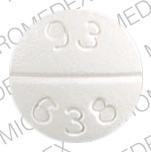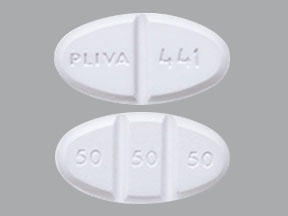Pill with imprint 93 638 is White, Round and has been identified as Trazodone Hydrochloride 100 mg. It is supplied by Teva Pharmaceuticals USA.
Trazodone is used in the treatment of Depression; Sedation; Major Depressive Disorder and belongs to the drug class phenylpiperazine antidepressants. Risk cannot be ruled out during pregnancy. Trazodone 100 mg is not a controlled substance under the Controlled Substances Act (CSA).

-
Trazodone Hydrochloride
- Imprint
- 93 638
- Strength
- 100 mg
- Color
- White
- Size
- 11.00 mm
- Shape
- Round
- Availability
- Prescription only
- Drug Class
- Phenylpiperazine antidepressants
- Pregnancy Category
- C – Risk cannot be ruled out
- CSA Schedule
- Not a controlled drug
- Labeler / Supplier
- Teva Pharmaceuticals USA
- National Drug Code (NDC)
- 00093-0638 (Discontinued)
Uses of Trazodone:
- Depression: Trazodone is mainly used to treat depression, particularly when it is associated with insomnia.
- Anxiety Disorders: It can help reduce symptoms of anxiety.
- Insomnia: Trazodone is often prescribed off-label to treat insomnia due to its sedative effects.
- Chronic Pain: It may be used as an adjunct to manage chronic pain in certain conditions.
How to Take Trazodone:
- Dosage: The dosage of trazodone varies based on the condition being treated, the patient’s age, and other factors. It is typically taken once or twice a day, often after a meal or a snack to reduce the risk of stomach upset.
- For Depression: The starting dose is usually around 150 mg per day, which may be gradually increased by the doctor. The dose may range from 150 to 400 mg daily, divided into smaller doses or as a single dose at bedtime.
- For Insomnia: A lower dose is usually prescribed, often around 25 to 100 mg before bedtime.
- Administration: Trazodone should be taken as prescribed by a healthcare provider. It is important to follow the dosing instructions carefully to avoid potential side effects or complications.
- Swallowing: Take the medication whole with a glass of water. Do not crush or chew the tablets, especially if they are extended-release.
- Missed Dose: If you miss a dose, take it as soon as you remember. If it is almost time for the next dose, skip the missed dose. Do not double up on doses to make up for a missed one.
Precautions:
- Alcohol: Avoid consuming alcohol while taking trazodone, as it can increase drowsiness and the risk of side effects.
- Interactions: Inform your doctor of any other medications or supplements you are taking, as trazodone can interact with other drugs, potentially leading to serious side effects.
- Side Effects: Common side effects include drowsiness, dizziness, dry mouth, blurred vision, and constipation. Severe side effects, such as changes in heart rhythm, should be reported to a healthcare provider immediately.
Trazodone Hydrochloride Off-label Usages
Trazodone Hydrochloride is primarily approved for the treatment of major depressive disorder, but it is also widely used off-label for several other conditions due to its pharmacological effects. Here are some of the common off-label uses:
1. Insomnia:
- Primary Off-Label Use: Trazodone is frequently prescribed for insomnia, especially when it is associated with depression or anxiety. Its sedative properties make it effective for helping patients fall asleep and stay asleep.
2. Anxiety Disorders:
- Trazodone can be used to manage generalized anxiety disorder (GAD), social anxiety disorder, and other anxiety-related conditions. It helps reduce anxiety symptoms by increasing serotonin levels in the brain.
3. Chronic Pain:
- It is sometimes used as an adjunct treatment for chronic pain conditions, particularly when these are associated with sleep disturbances or depression. Trazodone may help improve sleep quality and pain perception.
4. PTSD (Post-Traumatic Stress Disorder):
- Trazodone is used off-label to help manage symptoms of PTSD, particularly insomnia and nightmares. Its calming effects can be beneficial for patients with this condition.
5. Fibromyalgia:
- Patients with fibromyalgia, a condition characterized by widespread pain, may benefit from trazodone’s sleep-improving properties, which can indirectly reduce pain perception.
6. Migraine Prophylaxis:
- In some cases, trazodone is used off-label to help prevent migraines, particularly when they are associated with sleep disorders.
7. Alcohol Withdrawal:
- Trazodone may be prescribed to help manage symptoms of alcohol withdrawal, such as anxiety, agitation, and insomnia, although this use is less common.
8. Agitation in Dementia:
- In some cases, trazodone is used to manage agitation or behavioral disturbances in patients with dementia. However, this use requires careful monitoring due to the increased risk of falls and other side effects in elderly patients.
9. Panic Disorder:
- Trazodone may be used off-label to treat panic disorder, often in combination with other medications.
10. Eating Disorders:
- While not common, trazodone may be used as part of a treatment plan for eating disorders, particularly when these are associated with depression or anxiety.
Important Considerations:
- Efficacy and Safety: The effectiveness and safety of trazodone for these off-label uses can vary, and it is typically used when first-line treatments are ineffective or unsuitable.
- Consultation: Always consult with a healthcare provider before using trazodone for any off-label purpose, as the dosage and potential side effects may differ from its use in treating depression.
How Does Trazodone Hydrochloride Work ?
Trazodone Hydrochloride is an antidepressant that works by influencing neurotransmitters in the brain, particularly serotonin. Its mechanism of action is complex and involves several processes that contribute to its therapeutic effects.
Mechanism of Action:
- Serotonin Reuptake Inhibition:
- Trazodone primarily works as a serotonin reuptake inhibitor (SRI). It prevents the reabsorption (reuptake) of serotonin, a neurotransmitter, into neurons, making more serotonin available in the brain. Increased levels of serotonin can help improve mood, reduce anxiety, and alleviate symptoms of depression.
- Serotonin Receptor Antagonism:
- Trazodone also acts as a serotonin receptor antagonist, particularly at the 5-HT2A and 5-HT2C receptors. By blocking these receptors, trazodone helps modulate the activity of serotonin, reducing anxiety and depressive symptoms. This antagonism is also thought to contribute to its sedative effects.
- Histamine and Alpha-1 Adrenergic Receptor Blockade:
- Histamine H1 Receptor Antagonism: Trazodone has strong antihistaminic properties due to its ability to block histamine H1 receptors. This action contributes to its sedative effects, making it effective for treating insomnia.
- Alpha-1 Adrenergic Receptor Antagonism: Trazodone also blocks alpha-1 adrenergic receptors, which can cause vasodilation (widening of blood vessels) and may contribute to some of the drug’s side effects, such as orthostatic hypotension (a sudden drop in blood pressure when standing up).
- Impact on Sleep:
- Due to its combined actions on serotonin, histamine, and adrenergic receptors, trazodone has a notable sedative effect. This makes it effective for improving sleep quality in patients with depression, anxiety, or insomnia.
Summary of Effects:
- Antidepressant Effects: By increasing serotonin levels and modulating serotonin receptor activity, trazodone helps alleviate symptoms of depression.
- Anxiolytic Effects: The drug’s action on serotonin receptors also contributes to its ability to reduce anxiety.
- Sedative Effects: The antihistaminic and alpha-1 adrenergic receptor blockade lead to significant sedative properties, which are beneficial in treating insomnia but can also cause drowsiness as a side effect.
Teva Pharmaceuticals USA
Teva Pharmaceuticals USA is the American subsidiary of Teva Pharmaceutical Industries Ltd., an Israel-based multinational pharmaceutical company. Teva is one of the largest generic drug manufacturers in the world, with a strong presence in both branded and generic pharmaceuticals, active pharmaceutical ingredients (APIs), and over-the-counter (OTC) products. Teva Pharmaceuticals USA is headquartered in Parsippany, New Jersey, and plays a key role in the company’s operations in North America.
Key aspects of Teva Pharmaceuticals USA include:
- Product Range: Teva Pharmaceuticals USA offers a wide range of products, focusing primarily on generic drugs but also producing branded medications, biosimilars, and OTC products. Its portfolio spans various therapeutic areas, including neurology, oncology, respiratory, pain management, and cardiovascular treatments.
- Generics Leadership: Teva is a global leader in the production of generic drugs, making medications more affordable and accessible to patients. Teva Pharmaceuticals USA plays a crucial role in the company’s position as one of the largest generic drug suppliers in the US, offering a broad range of treatments across nearly every therapeutic category.
- Branded Products: In addition to generics, Teva has developed and marketed several branded specialty pharmaceuticals, including:
- Copaxone: A blockbuster drug for the treatment of multiple sclerosis.
- Austedo: A medication for Huntington’s disease and tardive dyskinesia.
- Ajovy: A preventive treatment for migraines.
- Biosimilars: Teva is actively involved in developing biosimilars—affordable alternatives to biologic drugs. The company is focusing on expanding its biosimilars portfolio, particularly in the areas of oncology and autoimmune diseases, to provide more affordable treatment options for patients in the US.
- Acquisitions and Growth: Teva has grown significantly in the US through strategic acquisitions. A key acquisition was that of Actavis Generics in 2016, which further cemented Teva’s leadership in the US generic drug market. The company also acquired Cephalon, a biopharmaceutical company, in 2011, adding several specialty drugs to its portfolio.
- Research & Development: Teva continues to invest in R&D, with a focus on complex generics, innovative specialty drugs, and biosimilars. The company operates multiple R&D facilities worldwide, including in the US, to support the development of new treatments and the continuous improvement of generic medications.
- Manufacturing Presence: Teva has multiple manufacturing facilities across the United States and globally, ensuring a robust supply chain for both its generic and branded products. These facilities meet regulatory standards from the US FDA and other global agencies, ensuring the quality and safety of its products.
- Corporate Social Responsibility (CSR): Teva Pharmaceuticals USA is committed to CSR initiatives, including improving patient access to healthcare, supporting disease awareness programs, and advancing environmental sustainability. The company also provides educational resources for healthcare professionals and patients.
- Challenges and Legal Issues: Like many major pharmaceutical companies, Teva has faced various legal and regulatory challenges, including lawsuits related to opioid distribution, patent disputes, and pricing investigations. These issues have had financial impacts on the company, but it remains a dominant player in the pharmaceutical industry.
Teva Pharmaceuticals USA is a key contributor to making affordable medications accessible to millions of people in the US while also expanding its presence in specialty drugs and biosimilars to offer innovative treatment options.
